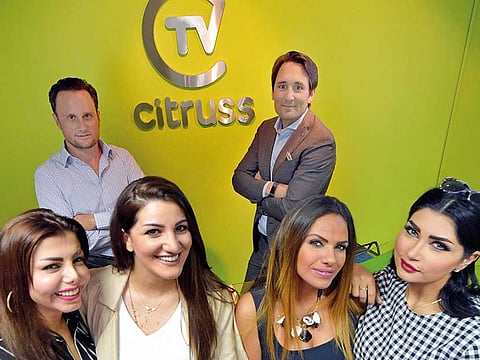TV remains a favoured shopping medium in Gulf
As in the e-commerce space, overseas investors are circling around potential picks

Dubai: The big corporate deals are not limited to the Gulf region’s online shopping portals... even TV-based shopping channels are catching the investors’ eye. Dubai-headquartered Citruss TV, the 24-hour home shopping channel operator, confirmed that new “strategic” investors could come on board before the year is out.
The channel is in advanced negotiations with Chinese and South Korean-based entities for a minority stake sale. Those funds, if the deal is effected, will come in mighty handy in creating more live and updated content from its Dubai studio as well as investing in supporting IT infrastructure.
But the bigger contribution will come by way of the knowhow an overseas investor in the same business of running home shopping networks can offer.
“The investors we are talking to have a huge access to products, and they can bring these at much better margins onto our platform,” said Michael Trueschler, co-founder of Citruss TV.
“If you compare us to Souq.com, our product inventory is much smaller now. That’s something we are looking to rectify with the new alliance.” (The identities of the potential investors were not revealed.)
TV-based home shopping seems to be holding on to its audiences in the Gulf. On this score, Citruss TV has no complaints. Saudi Arabia remains its biggest market (with 75 per cent of the revenues), and it has a committed viewer base — among women in the 25-44 age group — in the UAE and Kuwait as well. (In the UAE, Abu Dhabi is its biggest market. The TV channel is on all of the main region-facing satellites, “ensuring up to 95 per cent reach”.)
Impulse buying
Even with the battle for online shoppers, Citruss TV says its base remains intact. “The e-commerce audience is completely different... at best there might be some spillovers,” said Trueschler. “TV [home shopping] is often regarded as old-school, but that’s not been a problem for us.
“The rules of TV home shopping remain the same — it’s impulse buying and you have to catch the customer in 10-20 seconds. You are not going to get a potential shopper sitting down to view the offers end-to-end.
“You have a lot of customers passing by, see the channel, then get caught up by something you show them. Secret is to know what to say and demonstrate how to use the products.
“And we do have an omni-channel approach — selling via mobile and social media platforms apart from TV and even our version of e-commerce.
“I don’t see mobile-based [shopping through apps] as a threat — it helps us engage with our customers. As for revenues, 70-75 per cent is still from TV. But the fastest growth for us is coming from our mobile app, though it’s still quite small in comparison to what TV brings in.”
Thrifty customers
But one area that Citruss wants to improve upon is the average value of a purchase. It used to be around $220-$230 (Dh808 to Dh845) but since last year, that value is around $140-$150. Trueschler puts it down to Gulf consumers intent on being more thrifty.
“Since last year there’s been a demand for more competitive prices, whereas earlier they used to spend money left and right,” he said. “We have had to compromise on the margin — but it’s still healthy for a sustainable business. Even when you have an omni-channel approach, TV is what makes the company profitable.”
The average margins are in the range of 40 per cent, according to Trueschler, and “much higher than the-less-than 10 per cent e-commerce vendors in the region make because they focus a lot on electronics. Against that, our main categories are kitchen, home accessories and beauty. In the past beauty products [category] was our strongest.”
In the medium-term, Citruss TV will work on getting more volumes from skincare and fragrances, and if that proves successful, it could push the average order value back to around $180.
Further down the line, it could also put its weight behind generating apparel sales. But Trueschler says that while there is higher profitability on apparel, it also comes with risks attached.
“It is a segment that takes a long time to build up volumes,” he said. “But the biggest risk in this field is returns. And there are the logistics costs — in Saudi Arabia, the average cost is $17 and in the about $13. Then you add on the additional fee for cash-on-delivery, and it all adds up to quite a total. And 90 per cent of transactions are driven by cash-on-delivery. That’s where high costs prove a burden.”
Citruss TV has got plans for the new funds
If a new investor comes on board, Citruss TV will use those funds to top up its technology infrastructure.
“We present everything locally, from our studio at IMPZ,” said Michael Trueschler, co-founder of Citruss TV. “But with a strategic investor, we could create more live programming than the two hours we average now. That could make a big difference.”
It was in 2014 that Citruss had a major round of financing, in which private equity firm Valoris Capital participated. There was another round subsequently, with Valoris raising its stake.
“Citruss TV is very much undervalued,” Trueschler said. “We work towards profitability rather than that focus on growth, growth and more growth [at the expense of profits].
“We were profitable in 2010-11, and then we reinvested. Then when we had the big private-equity infusion, we ramped up a lot. Now, we are close to break-even.”



